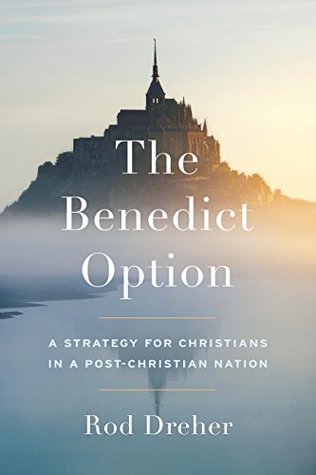More on this book
Community
Kindle Notes & Highlights
by
Rod Dreher
Read between
October 30, 2017 - March 7, 2018
Within the broad embrace of the church, monasticism provided much-needed help and hope to the peasantry, and thanks to Benedict, a renewed focus on spiritual life led many men and women to leave the world and devote themselves wholly to God within the walls of monasteries under the Rule. These monasteries kept faith and learning alive within their walls, evangelized barbarian peoples, and taught them how to pray, to read, to plant crops, and to build
things. Over the next few centuries, they prepared the devastated societies of post-Roman Europe for the rebirth of civilization.
MacIntyre said that a society that governed itself according to emotivist principles would look a lot like the modern West, in which the liberation of the individual’s will is thought to be the greatest good. A virtuous society, by contrast, is one that shares belief in objective moral goods and the practices necessary for human beings to embody those goods in community.
In a letter to soldiers in 1798, John Adams, a Founding Father and practicing Unitarian, remarked: We had no government armed with power capable of contending with human passions unbridled by morality and religion. Avarice, ambition, revenge, or gallantry, would break the strongest cords of our Constitution as a whale goes through a net. Our Constitution was made only for a moral and religious people. It is wholly inadequate to the government of any other.7
The Benedictines had no secret teaching. They had what they still have: the Rule, which shows how to order one’s life to be as receptive as possible to God’s grace, both individually and in community.
Father Basil Nixen, age thirty-six, and the monastery’s cook, said the Rule and even its more unusual rules don’t exist for arbitrary reasons. “The monk is deeply aware of the fact that in himself and in others, that order has been disturbed, has been disrupted by the Fall, by original sin, and by the personal sin of each person,” Father Basil said. “The monk enters the monastery knowing that finding that order doesn’t come easily. You have to fight for it, to work for it, and you have to be patient to achieve it. But it’s worth it, because that order gives us peace.”
The Benedictine example is a sign of hope but also a warning: no matter what a Christian’s circumstances, he cannot live faithfully if God is only a part of his life, bracketed away from the rest. In the end, either Christ is at the center of our lives, or the Self and all its idolatries are. There is no middle ground.


